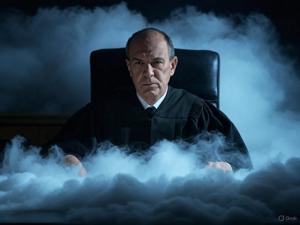




 |
||
 |
||
 |
||
 |
||
| Home About Die Bürgerstimme Contact Deutsch | ||
 |
Ist der Burgenlandkreis, unser Bundesland, die Bundesrepublik Deutschland totalitär?Kritiker würden diese Frage ganz klar mit Ja beantworten. Doch was denken Nicht-Kritiker? Auf der Website der Bundeszentrale für politische Bildung wird Totalitarismus beschrieben. Trifft dies auf unsere Region, unser Bundesland, die BRD zu? In Anlehnung an https://www.bpb.de/ Bundeszentrale für politische Bildung, Hans-Gerd Jaschke, 31.01.2008 mit Anmerkungen. TOTALITARISMUSDer Totalitarismus stellt das krasse Gegenteil des modernen freiheitlichen Verfassungsstaates und des Prinzips einer offenen, pluralen Gesellschaft dar. Die Geschichte des 20. Jahrhunderts ist von zwei gegenläufigen Prozessen gekennzeichnet. Auf der einen Seite ist die Demokratisierung und Liberalisierung insbesondere der westlichen Gesellschaften weiter vorangeschritten. Maßgeblich dafür sind die Erfolge demokratischer Politik, aber auch gesellschaftliche Veränderungen wie etwa der Wertewandel in der westlichen Welt und Prozesse der Individualisierung. ... z.B. gesunde Umwelt, gute soziale Beziehungen, Selbstentfaltungswerte, aber auch ideelle wie Frieden. Individualisierung wird ein gesellschaftlicher Prozess genannt, der in der modernen Dienstleistungsgesellschaft von immer größerer Bedeutung ist. Demnach ist der Mensch ... immer stärker auf sich selbst und seine Entscheidungen verwiesen. Beide, Wertewandel und Individualisierung, haben den langfristigen Prozess der Demokratisierung in der westlichen Welt wesentlich vorangetrieben. Auf der anderen Seite ... gibt es Totalitarismus, Extremismus und Fundamentalismus, eine beharrliche Kraft gegen Freiheit und Demokratie. Sie haben verschiedene gemeinsame Struktureigenschaften, die in sieben Punkten zum Ausdruck kommen. Totalitäre Bewegungen erheben erstens einen Alleinvertretungsanspruch. Sie verstehen sich als alleinige und ausschließliche Besitzer politischer, religiöser oder sonstiger weltanschaulicher "Wahrheiten". (dürfen Anweisungen nie hinterfragt werden, ehem. RKI-Chef Lothar Wieler?) Konkurrierende Bewegungen werden als Verirrungen oder Abweichungen (heute Fake-News ?) aufgefasst, die es zu bekämpfen gilt. Damit einher geht die maßlose Selbstüberschätzung und Selbstüberhöhung als einzige und erste Kraft in der Geschichte, die der Menschheit das Heil bringt. Ihr Messianismus ist absolut und unteilbar.  Totalitäre Regime und Bewegungen sind, zweitens, hermetisch abgeschlossene "Weltanschauungen". Sie sind, von innen betrachtet, rationaler Kritik nicht zugänglich. Ihre Ideologie entwickelt sich nicht in der permanenten, rationalen, diskussions- und lernbereiten Auseinandersetzung mit der Geistes- und Ideengeschichte, sondern sie beruft sich auf die angeblich "ewige" und unverrückbare Wahrheit bestimmter Lehrsätze. (Klimawandel ?) Weltanschauungen werden grundsätzlich nicht reflexiv und für die Diskussion offen fortentwickelt, sondern sie werden als vorgebliche Wahrheiten "geglaubt". Darin zeigt sich der quasi-religiöse Charakter aller totalitärer Glaubenssysteme. Lehrsätze werden nicht diskutiert und selbstkritisch überprüft, Kritik an ihnen gilt als abweichlerisches und sanktionswürdiges Verhalten.
Totalitäre Regime und Bewegungen sind, zweitens, hermetisch abgeschlossene "Weltanschauungen". Sie sind, von innen betrachtet, rationaler Kritik nicht zugänglich. Ihre Ideologie entwickelt sich nicht in der permanenten, rationalen, diskussions- und lernbereiten Auseinandersetzung mit der Geistes- und Ideengeschichte, sondern sie beruft sich auf die angeblich "ewige" und unverrückbare Wahrheit bestimmter Lehrsätze. (Klimawandel ?) Weltanschauungen werden grundsätzlich nicht reflexiv und für die Diskussion offen fortentwickelt, sondern sie werden als vorgebliche Wahrheiten "geglaubt". Darin zeigt sich der quasi-religiöse Charakter aller totalitärer Glaubenssysteme. Lehrsätze werden nicht diskutiert und selbstkritisch überprüft, Kritik an ihnen gilt als abweichlerisches und sanktionswürdiges Verhalten.
Sie verfügen, drittens, über eine anti-aufklärerische, absolutistische Legitimationsbasis. Nicht die Vernunft des aufgeklärten Subjekts, sondern die prophetischen, charismatischen Gaben des die Weltanschauung in idealer und absoluter Weise verkörpernden Führers (oder Führende, WHO, IPCC ?) gelten als einzige Quelle der Legitimation. Schon von daher sind konkurrierende und relativierende Argumente aus der Tradition anderer Ideengeschichten ausgeschlossen. ...Interne demokratische Willensbildung im Rahmen eines Primats des besseren Arguments läuft dem Führer-Prinzip zuwider und könnte die Allmacht der … Ideologie relativieren und delegitimieren. Aus diesem Grund kann es keine demokratische Willensbildung in totalitären Bewegungen geben. (bessere Argument, wenn zB. von der AFD ist prinzipiell abzulehnen ?) Sie sind, viertens, geprägt von Feindbild-Rhetorik und der rigiden Unterscheidung zwischen Gut und Böse. Gut ist die eigene Weltanschauung, mehr oder weniger böse ist alles, was ihr nicht folgen will oder kann….. Zwischen Gut und Böse, Richtig und Falsch, Freund und Feind, den fundamentalen und konstitutiven Unterscheidungen, werden in der Regel kaum Differenzierungen vorgenommen. So erklärt sich der beträchtliche Realitätsverlust (von Realität umzingelt ?) bei den Anhängern totalitärer Gruppierungen, den sie freilich erst in der Ausstiegsphase erkennen. Die autobiographischen Materialien von "Ehemaligen" liefern hierfür vielfache Belege. Die soziale und politische Basis totalitärer Systeme sind Bewegungen, von denen sie im Vorfeld und auch in der Systemphase getragen werden. Das fünfte und sechste Merkmal bezieht sich besonders auf diese Bewegungen. Totalitäre Bewegungen entwickeln, fünftens, um die Einzigartigkeit und Unverwechselbarkeit ihrer Ideologie zu zementieren, eigene Begriffssysteme mit Umdeutungen alltagssprachlicher Begriffe oder originären Bedeutungen. (Lehrer:Innen ?) Von den Fachsprachen der Wissenschaften, der Justiz, der Medizin, des Militärs, des Sports oder der Technik unterscheiden sie sich durch ihren suggestiven Charakter. Totalitäre Begriffe beanspruchen das Absolute und Nicht-Hintergehbare, sie sind der kritischen Reflexion und Infragestellung entzogen. Die Rhetorik des Marxismus-Leninismus und des Stalinismus kennt hierfür ebenso viele Beispiele wie die NS-Bewegung vor 1933 und der Nationalsozialismus an der Macht. Totalitäre Bewegungen richten sich, sechstens, gegen die Idee der Demokratie als solche, sie wollen den Stand der Demokratisierung und der Liberalität zurückschrauben. Demokratie und Totalitarismus sind gänzlich unvereinbar, weil die liberale Demokratie an den unveräußerlichen Rechten des Staatsbürgers ansetzt, der Totalitarismus hingegen unter Missachtung der bürgerlichen Freiheitsrechte an den Rechten des Kollektivs (Corona-Regeln ?). Deshalb reicht die prinzipielle und von innen gesehen auch notwendige Zurückweisung der Demokratie von taktisch geprägter Scheinakzeptanz über zurückhaltende Kritik bis hin zu militanten Versuchen, die Demokratie – etwa durch militante Provokationen – zu zerstören. Ein besonderes und für die zivile Demokratie gefährliches Problem ist siebtens das Gewaltpotential totalitärer Gruppierungen. Die klassischen Beispiele des Totalitarismus – Sowjetkommunismus und Nationalsozialismus – haben Gewalt nach innen und nach außen defensiv legitimiert: Man sei bedroht und umzingelt von aggressiven Feinden, deshalb sei Gewaltanwendung ein legitimer Akt der Notwehr. Totalitäre Organisationen, die sich selbst unter öffentlichen Druck gesetzt sehen, tendieren, so scheint es, dazu, Gewalt zu akzeptieren unter der Voraussetzung einer (scheinbar notwendigen) Selbstverteidigung. (Kriegswirtschaft ?) Nach innen hingegen, als Sanktionsmittel gegenüber Mitgliedern, Anhängern und – besonders – Abtrünnigen, scheint Gewalt in vielfältigen Formen ein selbstverständliches Mittel der Auseinandersetzung (Ballweg ?), ebenso gegenüber Personen und Organisationen, die als feindlich wahrgenommen werden. (Parteienverbot) Totalitäre Bewegungen vereinigen nicht nur das eine oder andere der genannten Strukturmerkmale, sondern, mehr oder weniger, alle sieben zugleich. Eben dies macht sie zu "totalitären" Gruppierungen. Sind der Burgenlandkreis, die Bundesländer, die BRD totalitär?Was ist ihre Meinung? Leben wir in einem totalitären Land oder ist es tatsächlich eine Demokratie? Oder ist es eine totalitäre Demokratie (von altgriechisch δημοκρατία dēmokratía Volksherrschaft), in der man zwar sein Kreuz bei der Wahl machen kann, dies aber letztlich nicht bedeutet, dass die gewählten Volksvertreter im Sinne des Volkes handeln (müssen). Schreiben Sie uns ihre Meinung und Erfahrungen per E-Mail. Diese wird hier gern veröffentlicht, wenn Sie das wünschen. Die E-Mail-Adresse sehen Sie nach einem Klick oben auf Kontakt. Literatur Hobsbawm, Eric: Das Zeitalter der Extreme, München/Wien 1995, S. 146.  Aus: Hans-Gerd Jaschke: Politischer Extremismus, Wiesbaden 2006, VS Verlag für Sozialwissenschaften. Der Band aus der Reihe "Elemente der Politik", hrsg. v. Hans-Georg Ehrhart, Bernhard Frevel, Klaus Schubert und Suzanne S. Schüttemeyer ist außerdem als Lizenzausgabe bei der Bundeszentrale für politische Bildung erschienen.
Aus: Hans-Gerd Jaschke: Politischer Extremismus, Wiesbaden 2006, VS Verlag für Sozialwissenschaften. Der Band aus der Reihe "Elemente der Politik", hrsg. v. Hans-Georg Ehrhart, Bernhard Frevel, Klaus Schubert und Suzanne S. Schüttemeyer ist außerdem als Lizenzausgabe bei der Bundeszentrale für politische Bildung erschienen.Author: Bundeszentrale für politische Bildung, möchte nicht genannt werden, Michael Thurm | vor dem 01.07.2024 |

|
| Other articles: |
 | Day of Reckoning – Sham Court Hearing at the District CourtOn Monday, 31 March 2025, it was the day of reckoning with the court hearing over my disgraceful offense – the alleged speeding violation.... zum Artikel |
 | 3 für Kreistag und Stadtrat - Madlen Walter, Grit Wagner und Thomas Hädrich-WagnerDie Kommunalwahlen stehen am 9. Juni 2024 an. Zahlreiche Kandidaten wollen gern in die Regional-Parlamente einziehen. Drei von diesen hier im Video-Interview!... zum Artikel |
 | Wer rettet die Ukrainer vor der deutschen Politik?Die Rufe in der Politik nach einer Rückführung von wehrfähigen Ukrainern werden lauter.... zum Artikel |
|
Support the operation of this website with voluntary contributions: via PayPal: https://www.paypal.me/evovi/12 or via bank transfer IBAN: IE55SUMU99036510275719 BIC: SUMUIE22XXX Account holder: Michael Thurm Shorts / Reels / Kurz-Clips Imprint / Disclaimer |